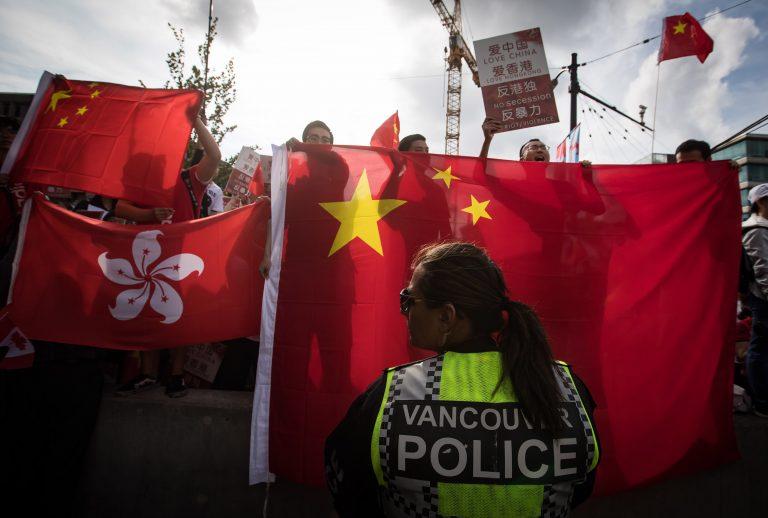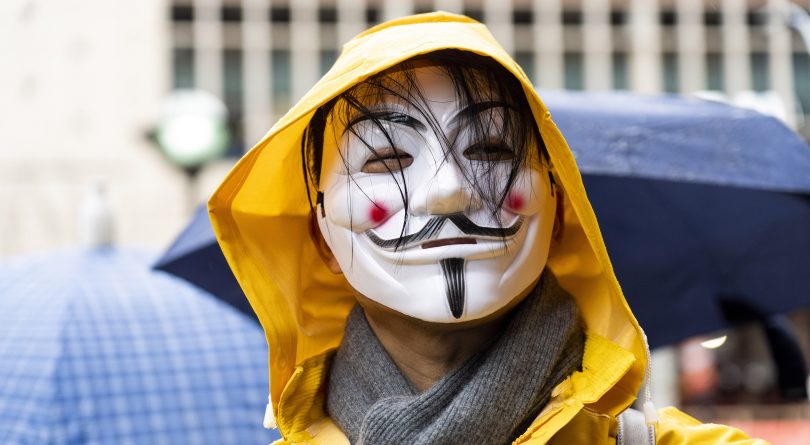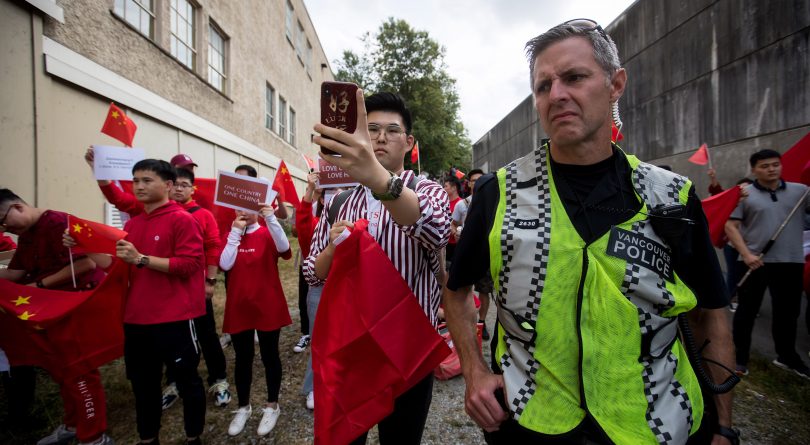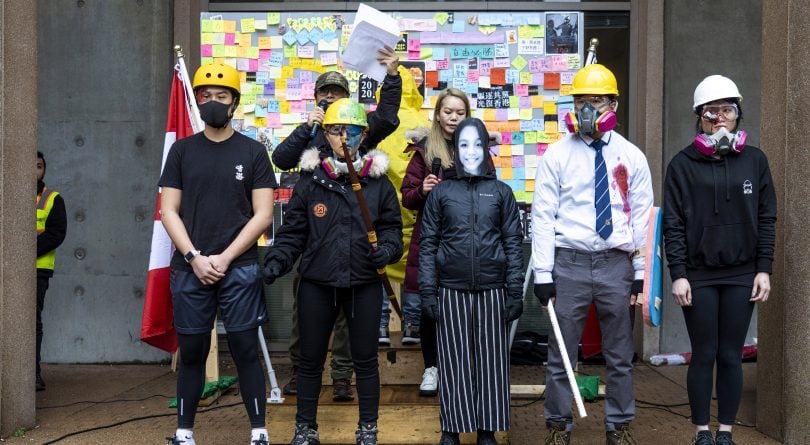In the battle over Hong Kong, the surveillance state knows no boundaries
There is a proxy war happening in Vancouver over Hong Kong and activists say that not only are they being watched, but pro-Beijing provocateurs are trying to intimidate them

A police officer watches as pro-China counter-protesters shout at Hong Kong anti-extradition bill protesters holding a rally, in Vancouver, on Saturday August 17, 2019. (Darryl Dyck/CP)
Share
There were many umbrellas. There were the vast black ones that a huddle of people can fit underneath. The blue-and-yellow striped ones. The ones once borrowed from a hotel.
Some of the umbrellas were yellow, emblazoned with the words “support freedom” and “oppose crime” in red Chinese characters. They matched the neon security vests worn by volunteers along the edge of the crowd of about 150 people.
In Vancouver, the umbrellas served no practical purpose except to shield demonstrators from spitting rain on a January afternoon. In the special administrative region of Hong Kong, umbrellas are handy for another reason: they protect their owners from rubber bullets fired by police.
After chanting loudly in favour of Hong Kong autonomy, the crowd posed for a group photo in the rain, most of them holding yellow printouts that read “resist,” “persist” or “unite” in Chinese. Two people held, instead, light blue East Turkmenistan flags—in honour of the Uighur Muslims held in concentration camps in China’s Xinjiang province, another ostensibly “autonomous” region. A prominent banner, held by the front row, called for their release.
Between a quarter and a third of the group wore face coverings so they could remain anonymous. One person chose a Guy Fawkes mask for that purpose. Most, like a married couple who wished to be referred to only by their initials, went with plain black surgical masks.

J. and B. explained that supporters of the protest movement conceal their names or faces so they can protect friends and family back home. In the gaggle of photographers capturing the staged photo, there could easily be a Chinese Communist Party agent, they said, ready to use facial recognition technology to identify people and intimidate their loved ones.
J. and B. are Canadians. Both hail from Hong Kong. They spent six months there last year, witnessed the early days of the protest movement, and returned to Vancouver in August. They do not intend to go back. “It’s dangerous,” said J.
But even having landed in a country that preaches freedom of assembly and expression, they feel watched by a surveillance state that does not respect borders. They’ve heard reports of police in China harassing relatives of pro-Hong Kong protesters abroad. They feel menaced, too, by a new breed of rabble-rouser that in recent months has turned up in force at demonstrations like this one to shout at them, tear down their protest installations and, in a couple of cases, instigate physical confrontations.
The Hong Kong community derisively refers to the provocateurs, mainly assumed to be Chinese international students, as “little pinks.” Pink, as in: tinged by Communist Party red. “We get harassed. Whatever we say, of course they say the opposite,” said B., describing a demonstration at the University of British Columbia in the fall. “I remember one man, he was an elderly guy, he was just drawing something on the ground with chalk. And they were pouring water on it.”
Outside of a passionate group who regularly attend such rallies—people who, like them, often remain anonymous—J. and B. feel they are in an increasingly vulnerable minority, living in a divided community that’s adrift in a sea of Canadians who just don’t pay much attention.
Fifteen minutes after the rally, the umbrellas had dispersed and the public square in front of Vancouver’s downtown library had reverted to being empty, wet and grey. The city hummed along, seeming not to care.
If any place in North America contains a microcosm—or at least a weird dystopian reflection—of the conflict between Hong Kongers and the People’s Republic of China (PRC), it is Vancouver.
In a city that has more than 400,000 people who self-identify as ethnically Chinese, about 72,000 are immigrants from Hong Kong and 189,000 are immigrants from the mainland, according to 2016 Census data. (Based on immigration figures, that gap has likely widened over the past four years.) Some 300,000 Canadian passport holders, meanwhile, live in Hong Kong.
The British Columbia government reported in December 2018 that more than 20,000 of its post-secondary international students had come from the PRC—an inflow that has been a major financial boon to the province’s universities. Within Vancouver’s Chinese community, divisions are not easily drawn along age, citizenship or even language lines. You hear both Mandarin, commonly spoken on the mainland, and Cantonese, spoken in Hong Kong, but it’s tricky to make assumptions about the speakers’ politics. Suffice to say, those working in the community say the situation in Hong Kong has served to deepen existing rifts, while highlighting growing concerns over the influence of the Chinese state on communities overseas.
Protests in Hong Kong began last summer over a proposed extradition bill that was feared would give China extraordinary powers over its justice system. The demonstrations escalated as city police were accused of brutal crackdowns against protesters.
The largest marches have seen two million people—more than a quarter of the city’s population—in the streets demanding that China hold to its “one country, two systems” promise. (In 1997, the United Kingdom handed the colony over to Beijing per a constitutional arrangement that would keep it an autonomous region, with its own system of governance, for 50 years.)
Although the extradition bill has been set aside for now, in the wake of mass arrests, the deaths of two protesters in November and allegations of unrestrained police brutality—a reported 88 per cent of the city is believed to have been exposed to tear gas—protests have continued. Dissidents are demanding full withdrawal of the bill, an inquiry into police conduct, a retraction of the characterization of protests as “riots,” amnesty for those who have been arrested, and universal suffrage to elect the city’s legislative council and chief executive.
Well-positioned to watch Vancouver’s reaction to all of this is Kevin Huang, executive director and co-founder of the non-profit Hua Foundation, which is focused on heritage and sustainability work in Chinatown. “It hits close to home for a lot of people,” he said. “I think it’s due to the long-standing history, and just the sheer number of people who have connections to Hong Kong.”
Many members of the community have friends or relatives that are “across the line” from each other, he said. Plenty of Mandarin speakers are quietly, even overtly supportive of the protests—some organized their own demonstration supporting Hong Kongers at Richmond City Hall in December. And not all Cantonese-speaking Hong Kongers support the protesters.
READ: Hong Kong protestors to democratic leaders: Stand up for us before it’s too late
In late June last year, not long after the demonstrations began, 20 Vancouver-based students published an open letter supporting protesters in the Toronto Star. On the same day, in Toronto and Vancouver, the Chinese Benevolent Association paid for an ad praising the crackdown on “radical” protesters in the Chinese-language Sing Tao and Ming Pao newspapers. The CBA, one of the oldest Chinese organizations in the country, has deep ties with Chinese-Canadian businesses and community leaders, and Hong Kongers have taken it as a disturbing sign that its politics on this issue have become so overt.
“We are very much opposed to all the violence we have seen in all the protests and activities around Hong Kong,” said Jun Ing, vice-president of the association’s Vancouver chapter, in an interview. When asked to clarify whether the group also condemns violence perpetrated by police, he responded: “Any violence.”
Ing said the issue has been divisive. “I guess this is what democracy is all about, is people having different views and different ideas and different opinions.” With the ads last summer, he added, his organization took a “more passive approach” than those few who have been showing up at protests and counter-protests.
But not-so-passive pro-Beijing partisans are increasingly on the scene. And they are expressing Chinese nationalism in a way Vancouver activists have never seen before.
Since the massacre at Tiananmen Square in 1989, Mabel Tung, chair of the Vancouver Society in Support of Democratic Movement, has organized protests to demand democracy in China. Last summer was the first time she ever saw a counter-protest.
“That kind of surprises me, because in Canada we all have our freedom of speech, freedom of assembly, we freely can speak our mind.” The new counter-protesters, Tung adds, are going about their work “in a really aggressive way—shouting at us, and it seems like they want to hit us.”
Although the Hong Kong protesters are not explicitly demanding independence from China, its governing Communist Party has painted their movement as an insurrection, a violent independence movement. “That’s why [the pro-Beijing counter-protesters] are so angry. I don’t blame them, because this is what they think,” Tung said. “This is what they’ve been spoon-fed.”
Maclean’s made efforts to speak to pro-Beijing activists, attending Hong Kong-related events in search of them, and reaching out through student groups. But they, too, seem inclined to anonymity. And while some Hong Kong organizers said they recognize repeat antagonists, they were reluctant to share photos or names, saying to do so would be to sink to the level of “doxxing” they associate with their opponents.

On Aug. 17, hundreds of people gathered outside the Broadway-City Hall SkyTrain station to support the Hong Kong protests. They were met by a contingent of people promoting “one China.”
Jane Lee, a founding member of the New Hong Kong Cultural Club, said PRC supporters accused Hong Kongers of being rioters who damage the rule of law and the economy—in line with what Chinese state media have propagated, she told Maclean’s through Telegram, an encrypted messaging app. “It is obvious that they were driven, or controlled,” she said.
Huang was there, too. To him, it seemed as though the counter-protesters were on a schedule or shift—almost all of them disappeared at 6 p.m. “So were they really there of their own volition, or were they there for something else? Why would this number of people, probably a hundred plus people, all of a sudden just dissipate?”
On Oct. 1, a group of high school students organized a demonstration at Aberdeen SkyTrain station in the suburb of Richmond, where they put up a Lennon wall—a collection of handwritten Post-it notes supporting Hong Kong, and inspired by the original John Lennon wall in Prague.
YouTube videos from that day show another group of young people arriving, tearing down the wall and getting into a shoving match with those trying to protect the installation. The two groups swear at each other in Cantonese. Those tearing down the Lennon wall are called “bastards” and told to “go die.”
READ: While Hong Kong fights for democracy, Canada goes silent
The following weekend, police were called to a similar confrontation with counter-protesters. RCMP eventually arrived and separated the two groups.
Scuffles have occurred not only at organized rallies but among individuals. According to a report in December from Sing Tao, a boy at the Richmond Middle School was bullied in the lunchroom after he said things supportive of Hong Kong during a class. Another student, a Taiwanese boy, found a threatening letter that had been slipped into his locker for the same reason. A third student’s mother told the newspaper: “Ever since this happened, my child does not dare to publicly talk about Hong Kong news, for fear of becoming the target of students who disagree.”
A different school in Richmond, Steveston-London Secondary School, had come under fire weeks earlier after parents complained that a Mandarin language teacher was showing pro-China propaganda—a trailer for a film commemorating the 70th anniversary of the founding of the People’s Republic of China.
In January, UBC student hub The Nest still featured a Lennon wall, with Post-it notes of all colours stuck on a section of concrete—although many more students were milling about at a poster sale down the hall than reading them. Some messages of support were in English, many in Chinese: “Go Hong Kong!” and “Students are not terrorists” and “Even if they beat us we must resist.”

Others were more cryptic, betraying divisions that have muddled the issue for so many in Vancouver. “Do you eat sweet or salty tofu pudding?” said one note, referring to a culinary debate on which Hong Kongers have taken a firm position—they like it sweet. Said another: “The piece of land that is Hong Kong is part of China. If you don’t like it, please leave. Don’t let freedom and democracy break your thinking.”
Sources of information in Canada may be plenty and varied, but many Chinese here are still informed by the social-media bubble that prevails in their homeland, where people self-censor by avoiding certain issues, and in which algorithms automatically delete posts that reference topics the government doesn’t want discussed, according to Leo Shin, an associate professor of Chinese history at UBC.
Some mainlander students, he said, have spoken to him privately about how they see Hong Kong’s democracy movement as a beacon of hope for the rest of China. Others have been conditioned to distrust Western social-media networks and news outlets. “You have an ecosystem that echoes the notion that China is coming of age, China is powerful, China should be allowed to continue on this path of growth,” Shin explained, referring to platforms such as WeChat. “I don’t want to use the word ‘brainwash,’ but once you are exposed to that narrative, that ecosystem, for a long enough time, you get sucked into it.”
Occasionally, overseas Chinese are explicitly asked to toe the line, as they were in a news article by the state-owned China Daily in August 2018 that urged them “to remember the call from the Party and the people, spread China’s voice, support the country’s development, safeguard national interests.”
But the state’s influence over its citizens is often more subtle and nuanced than that, according to Sharon Hom, executive director of Human Rights in China. At a press conference in Vancouver in January, Hom said she sees fingerprints of the United Front here—a department of the Communist Party that wages influence campaigns abroad and whose main job is, she says, to “monitor and to ensure the ‘correct behaviour’ of overseas Chinese.”
READ: Canada is being bullied by China. Here’s how it can shut it down.
Hom, a human rights lawyer based in New York, has heard of mainlanders who were spotted supporting the Hong Kong movement at marches abroad, and whose parents back in China were then visited within 24 hours by police. “We have to think about the whole web of monitoring, surveillance and control. It is so systematic. It sounds unbelievable, except that it’s true.”
Hom was in town to give a talk at the main branch of the Vancouver public library. Her speech was attended by more than a hundred people—despite the rain—but featured a few dozen empty seats. Some people in the room wore masks. Organizers asked attendees not to take photographs of the front of the crowd, so that nobody in the room could be identified.
Distrust of anyone with a camera is widespread among Vancouverites who want to mobilize against the Chinese government. “People say, ‘pinkies are taking pictures of everybody’ at protests,” says Huang, from the Hua Foundation, “so all the local folks actually mask up, sunglasses, hats, dress differently, perhaps at the mall outside the rallies they change.”
There is consensus among activists that this sort of surveillance is happening all the time, and is linked to the Chinese government, whether through its consulate in Vancouver, the more shadowy United Front or self-starting zealots.
But the consulate itself, while it praises its patriots, denies any direct involvement. “It is totally understandable and reasonable for local overseas Chinese to express indignation and opposition against words and deeds that attempt to separate China,” the consulate said in an emailed statement to Maclean’s. “We hope such opinions can be expressed in a rational way within the scope of local laws and regulations.
“Some forces with ulterior motives arbitrarily smear the Chinese government and its diplomatic missions overseas. We condemn such groundless accusations and malicious attacks.”
Shin worries that rifts in Canadian Chinese communities will become more entrenched, even violent, as a pattern of protest and counter-protest repeats itself.
The Hong Kong story, at least as it plays out here, is also part of the bigger story of Canada-China relations, he said, given the umbrage Beijing takes at the mildest expressions of concern for the Hong Kong protesters. There is mounting pressure on the Canadian government to take a clear position: Cherie Wong, from the Alliance Canada Hong Kong, a new advocacy group, said in a recent press conference that the silence of politicians such as Prime Minister Justin Trudeau is “an act of violence.”
But Ing, from the Chinese Benevolent Association, said it’s a “minefield” and “nobody wants to touch it.” And looking at things from Ottawa’s perspective, it’s easy to discern why. For more than a year, Canada’s relations with China, the world’s second-largest economy, have been at a freezing point. The possible extradition of Huawei executive Meng Wanzhou to the U.S. on fraud charges is working its way through the court system in B.C. after her arrest in December 2018. In apparent retaliation for Meng’s arrest, China arrested two Canadians, Michael Spavor and Michael Kovrig, on unsubstantiated charges, and has used non-tariff barriers to ban Canadian products from its market.
Canada, meanwhile, has made no decision on whether to ban Huawei from its 5G networks, as some of its allies have done.
An increasingly popular way to contribute to the dissident movement in Hong Kong is to support businesses that explicitly back the protesters, sometimes with free meals or supplies—part of what’s known as the “yellow economic circle.” Businesses known to be pro-police are considered “blue,” and protesters boycott them.
Colour-coded charts on social media, featuring cartoon pigs and frogs—symbols of the protests—help shoppers avoid purchasing brands, products and services that come from mainland China, or are associated with Chinese companies.
Rick Lau, a recent Hong Kong immigrant to Vancouver, is hoping to replicate the colour-coded designations here in Canada, although on a much smaller scale. He is encouraging fans of his popular Facebook page, “Canada HongKonger,” to recommend businesses that seem anecdotally “friendly” toward Hong Kong protesters.
Ing doesn’t believe businesses should have to declare themselves on one side or the other. “I’m guessing it’s fifty-fifty, when it comes to which side people are standing on,” he said. “Why would anybody want to cut your business by half?”
Lau, too, thinks the split in Vancouver over Hong Kong runs about fifty-fifty, but suspects a lot of Canadians just don’t care. “I don’t know why, but in Canada, they’re not too sensitive to this kind of politics. Even not sensitive to local issues, most of them. Maybe it’s too easy a life here.”
His idea for designating yellow and blue businesses hasn’t exactly gone viral. Crowd-sourced spreadsheets Lau posted in November have not been updated much since, despite attracting some media attention.
The owner of an auto repair shop told CBC in December he was “surprised” to be on a list of yellow businesses—but he might put a Lennon wall in his office.
Other businesses Maclean’s got in touch with were similarly confused. Michael Tam, the owner of In-Look Optical in Coquitlam, said he had “no idea” where this was coming from. He figured perhaps it was because a coworker recently returned from a trip to Hong Kong. “Maybe they talked to the customer,” he said. Tam was careful to emphasize that his business doesn’t take an official position one way or the other: “Hong Kong, we don’t care—it’s a Hong Kong problem, right? It’s not in Canada.”
Some businesses are listed as green, or neutral, in one case for having a “yellow owner” and a “blue manager.” Many businesses are considered blue, Lau explained, if they play TVB on their TVs all day, a Hong Kong-based network that is seen as a biased parrot of the state-controlled channel, CCTV. (A handful of “blue” businesses did not respond to requests for comment.)
About 48,000 people subscribe to a channel on Telegram that pushes out memes and updates on the Hong Kong protests in English. One post in January offered the “Pantone media spectrum of Hong Kong.” TVB is assigned the third-darkest shade of blue. “Guard your conscience—don’t be a puppet,” the infographic says, next to a cartoon of a puppet frog. (“Feels bad, man,” the frog says, with an arm inside it.)
The Polygon Gallery in North Vancouver was mostly empty. It was the first day of an exhibit called The Revolution of Our Times that featured scenes of the Hong Kong protests snapped by 18 photojournalists.
Young girls with hands clasped in a chain around their school. A man holding up a protest sign from his apartment window. Elderly Hong Kongers with their palms over their right eyes, paying tribute to a protester whose eye was allegedly injured by a beanbag round fired by anti-riot police.
Photographers Aaron Guy Leroux, an American based in Hong Kong, and Adam Malamis, a Canadian based in London, Ont., were prepared to give a first tour of the exhibit that morning to some people who had signed up online.
None came. It was snowing.
Leroux said Hong Kong is saturated in protest culture, and “no one is left untouched by what’s been happening.” People yell protest chants out their windows every night at 10 p.m., without fail. Everyone is aware of the risks they take to participate, but there is some safety in numbers, too. Counter-protests by pro-Communist Party mainlanders are “laughably small,” he said.
Leroux knows the risk he personally takes by speaking out publicly. He has already been fired from a teaching job in China for images posted to his Instagram account.
But he and Malamis are determined to document the movement, which presses on even as hopelessness sets in. Malamis said he kept seeing the phrase “if we burn, you burn” written on barricades at protests in Hong Kong last year. Somebody told him: “You don’t have a slogan like, ‘if we burn, you burn’ and expect to win.”
“They call themselves the cursed generation, and they’re kind of fatalistic,” Leroux said, with a sort of awe. “Because no matter what happens with this, no matter how it resolves itself, in 2047 China will have full control over Hong Kong. So where will they be? They have no ability to fend [Beijing] off in a meaningful way. They’re fighting the good fight, as far as they’re concerned. But nobody’s really optimistic.”
Neither are activists in Vancouver optimistic that they’ll get through to the Canadian government with their regular rallies and short-lived Lennon walls. Nor that they’ll have much influence over the Canadian business community, or the indoctrinated “little pinks.” Or even the residents of Vancouver, who on the whole seem oblivious that an existential fight for democracy is being waged 10,000 km away.
Still, those who care show up, umbrellas in hand and spirits undiminished. Even if the forecast is poor.
This article appears in print in the March 2020 issue of Maclean’s magazine with the headline, “The proxy war over Hong Kong” Subscribe to the monthly print magazine here.